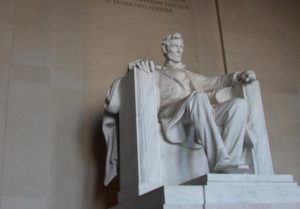Peng: Atheism in the Bible Belt
February 12, 2018
When I was younger, I never fully understood the impact that the statement “I don’t believe in God” had on people’s perception of me. My step-father was a self-pronounced atheist, and my mother had no religious preference. I grew up in a respectful family without the church services and sermons essential for moral competence in the Bible Belt.
As it turns out, “about half of Americans say the growing number of ‘people who are not religious’ is bad for American society,” according to the Pew research Center. Only 3.1 percent of Americans identify as atheist and this percentage is expected to be lower in the Bible Belt in the southern United States. Will Americans learn to be more tolerant with this growing number? After all, America was founded on fundamentals of equality—religious equality included. Despite the first amendment of “Freedom of Religion,” “In God we Trust” is plastered imposingly on school walls and coinage. “One nation, under God” must flow out of our mouth to pledge allegiance to our country. Maybe we can blame this as a product of the Cold War, but even then it’s ironic that our patriotism surrounds faith in one religion when our constitution pledges freedom for all.
In the Bible Belt, this expected uniformity in religion is only enhanced. Morality today is so closely tied with religion that I’m constantly questioned, “How can I be a good person without believing in God?” Growing up, I’ve always been met with “Bless your heart,” shocked stares, or blatant disgust once identified as an atheist. I was discouraged from asking questions, felt uncomfortable in the classroom, and was constantly targeted by teachers. My questions and comments in class were viewed as distractions. My opinion simply didn’t matter.
My experience, however, isn’t solitary. According to an article in the Scientific American, “Atheists are one of the most disliked groups in America. Only 45 percent of Americans say they would vote for a qualified atheist presidential candidate, and atheists are rated as the least desirable group for a potential son-in-law or daughter-in-law to belong to.”
So what does this mean in Trump’s America–a government that highlights a return to traditional America when the number of non-religious people only seems to incline? I can answer that in two words: nothing good. In an article ironically entitled “Trump is a great champion of religious liberty” Trump’s message in the Values Voter Summit in 2017 was clear: “In America we don’t worship government–we worship God.” Not only is this a terrifying proclamation for non-religious Americans, but Trump’s statement shows he does not believe in a secular government, something that defined American policies from the beginning.
In the same article, Trump states, “Religious liberty is enshrined in the very first amendment of the Bill of Rights. And we all pledge allegiance to…one nation under God. This is America’s heritage, a country that never forgets that we are all are–all, every one of us–made by the same God in Heaven.”
Considering the context and point of view of Trump’s statement, his words could just be used to appeal to his audience in the Values Voter summit. Even then, this implies that religion must be used to appeal to voters with value. Having the president of the United States be more devoted towards “God” rather than his own job in government is frightening. Ironically, this same article stated “Values Voter Summit attendees were thrilled to see the president promote religious freedom in his speech.” But when Trump refers to religious liberty, he is referring to Christian liberties, probably appealing to the topic of abortion. But the clear assertion of Christianity as the religion worthy of freedoms blatantly ignores the freedom for all religion. Given, there is no way for complete freedom of religion, but a respect if religious diversity in-and-of itself is a high goal for America to start with.
Let me take a step back first and make something clear: In no way am I arguing against religion; I’m simply explaining my perspective. There is a common perception that atheists are blatantly against religion. That may be true for some atheists, but this is not true for the majority. Not believing in god is does not mean that you are immediately Satanist. We aren’t choosing sides because for us, there is no side to believe in. It’s not that I believe that religion is dangerous and negative. In fact, I admire people’s faith in religion and seeing that it has done for people had help me gain a tremendous respect for it.
In a larger sense, I am also speaking in support of other religious minorities and arguing for true practice and celebration of religious equality. Religious minorities, such as Buddhists, Hindus and Muslims, voice a similar opinion about social isolation due to their religion.
“Everyone thinks that there is only one religion and that’s their religion, and if you’re not that religion, then you’re wrong,” a person in the religious minority told me anonymously. “For me at least, it almost degrades others opinion of me. Especially in Mississippi.”
Similar experiences follow from the perspective of an atheist, who chose not to reveal his identity in fear that it would affect his reputation:
“For the most part the Christian faith dictates daily lives… Of course it changes depending on the region but for your average Mississippian. In general, policies of the state government are shaped by these values. In all honesty, our government is not as secular than it should be”
Not only politically, but his atheism has had an impacted him directly in day-to-day life.
“Ever since I’ve been atheist, I feel that this has influenced a negative perception. When I was trying to get of a job last summer, during our interview the subject of religion somehow came up. I didn’t get the job and there was no competition.”
Religious freedom is not the freedom of religion to do what they want. Instead, it is founded on respect for other religions. The realizations that one’s religions, their beliefs, should not be the definition of their character.
“(Religion is) becoming less important. Growing up in the south religion is such a huge part of society…No one should ever be segregated because of their religion. The stigma is wrong. The problem is that no kids are educated on religion and are becoming really ignorant,” my anonymous source claimed.
There are labels for people who break other freedoms. Racism is the” belief that race is the primary determinant of human traits and capacities and that racial differences produce an inherent superiority of a particular race.” Sexism is “prejudice or discrimination based on sex” both according to the Merriam-Webster dictionary. Religious discrimination is just as urgent as racism, sexism, and any other type of discrimination today.
Growing up atheist in the Bible Belt, I have realized the importance of religious freedom, and in the scope of America’s future today, the celebration of the first amendment today doesn’t look so bright today.













Helen Ormon • Feb 22, 2018 at 9:37 am
Helen, younarticulate what many are thinking. I commend you for the courage of your convictions. Speaking out in the Bible Belt was not easy.